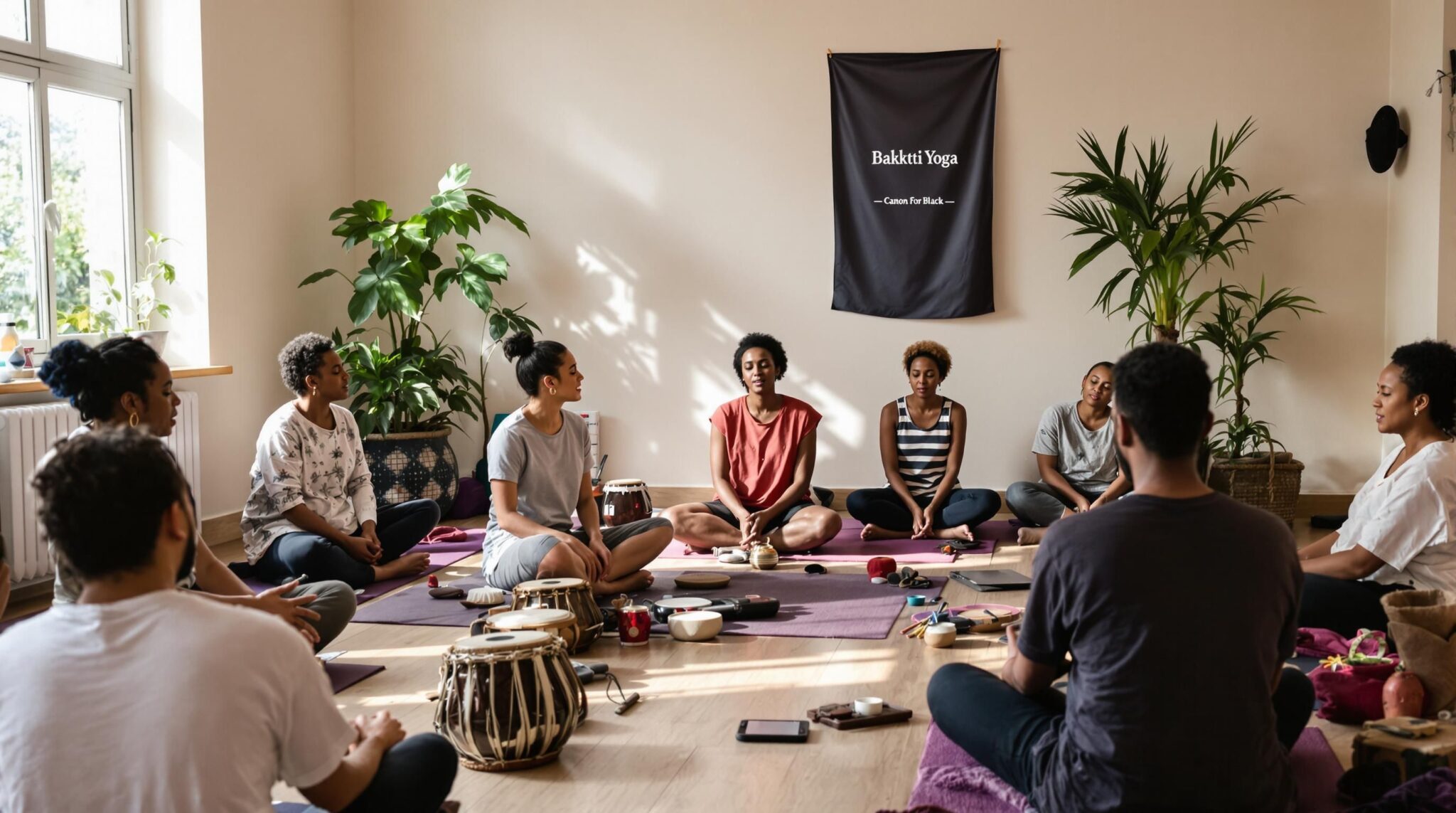
Bhakti Yoga sounds like just another spiritual tradition, but it holds a unique place in the world of yoga. Some yoga paths focus on sweat and strength or quieting the mind, and yet Bhakti Yoga thrives on emotion, song, and heartfelt devotion. What catches most people off guard is that its power for transformation is more than a feeling—studies show that Bhakti Yoga practices like kirtan and mantra meditation can actually reduce anxiety and boost emotional resilience. It’s not about strict routines or perfection. It’s about finding joy, love, and deep connection through simple, honest acts of devotion.
Table of Contents
- Understanding The Essence Of Bhakti Yoga
- Core Principles And Practices Explained
- Benefits Of Bhakti Yoga For Modern Practitioners
- How To Integrate Bhakti Yoga In Training And Retreats
Quick Summary
| Takeaway | Explanation |
|---|---|
| Cultivate unconditional love through devotion. | Bhakti Yoga focuses on developing a profound emotional connection, enabling practitioners to express and experience pure love for the divine. |
| Integrate diverse devotional practices. | Explore various approaches like kirtan, puja, and mantra meditation, allowing personal expression of devotion tailored to individual preferences. |
| Use Bhakti Yoga for emotional healing. | The practice reduces stress and enhances mental well-being, helping practitioners build resilience and emotional intelligence in daily life. |
| Embrace humility and service in practice. | Engaging in selfless service fosters a spirit of humility and compassion, essential aspects of the Bhakti Yoga journey. |
| Create holistic learning experiences for students. | When teaching, focus on nurturing emotional growth and spiritual connection, ensuring a respectful and inclusive environment for all practitioners. |
Understanding the Essence of Bhakti Yoga
Bhakti Yoga represents a profound spiritual path of devotional practice that transforms human emotion into a sacred connection with the divine. Unlike other yoga disciplines that focus primarily on physical movement or mental discipline, Bhakti Yoga centers on cultivating unconditional love and complete surrender to a higher spiritual reality.
The Philosophical Heart of Devotional Practice
Research from the Encyclopaedia Britannica reveals that Bhakti Yoga is fundamentally a spiritual journey of emotional transformation. At its core, this practice transcends mere intellectual understanding, inviting practitioners to experience a deep, personal relationship with the divine through pure, unrestrained love. The path is characterized by emotional vulnerability, where practitioners learn to dissolve their ego boundaries and connect with a universal consciousness through profound devotion.
Traditionally, Bhakti Yoga involves multiple approaches to expressing devotion. These can include chanting sacred mantras, performing ritualistic worship, meditation on divine qualities, and developing an intimate emotional connection with a chosen deity or spiritual representation. The ultimate goal is not just to worship externally but to internalize divine qualities and cultivate a state of continuous spiritual awareness.
Pathways of Devotional Expression
According to the Routledge Handbook of Yoga and Meditation Studies, Bhakti Yoga offers multiple pathways for spiritual seekers to channel their devotional energy. These pathways recognize that individuals connect with the divine through different emotional and psychological temperaments.
Some practitioners might find deep connection through kirtan (devotional singing), where rhythmic chanting creates a trance-like state of spiritual immersion. Others might prefer puja (ritualistic worship), involving carefully designed ceremonial practices that symbolize inner spiritual transformations. Some practitioners gravitate towards japa (repetitive mantra recitation), using sacred sounds to gradually align their consciousness with divine vibrations.
The beauty of Bhakti Yoga lies in its inclusive approach. It doesn’t mandate a single correct method but encourages practitioners to discover their most authentic mode of spiritual expression. Whether through song, prayer, service, or contemplative practices, the path remains deeply personal and intrinsically transformative.
For aspiring yoga teachers, understanding Bhakti Yoga means recognizing it as more than a practice—it’s a holistic approach to spiritual growth that integrates emotion, devotion, and consciousness. Learn more about integrating yoga philosophy into your teaching practice.
Each practitioner’s journey is unique, shaped by individual temperament, cultural background, and personal spiritual insights. Bhakti Yoga invites individuals to transform their relationship with the divine, turning every moment into an opportunity for profound spiritual connection and inner peace.
Core Principles and Practices Explained

Bhakti Yoga emerges as a profound spiritual discipline that transforms devotional energy into a comprehensive path of personal transformation. Unlike other yoga practices that emphasize physical postures or mental control, Bhakti Yoga centers on cultivating a deep emotional connection with the divine through structured yet intensely personal practices.
The Nine Essential Forms of Devotion
According to scholarly research from Wikipedia, Bhakti Yoga traditionally recognizes nine fundamental forms of devotional practice known as Nava Vidha Bhakti. These interconnected approaches provide practitioners multiple pathways to express spiritual devotion:
- Shravana: Listening to sacred scriptures and spiritual narratives
- Kirtana: Singing devotional songs and chanting divine names
- Smarana: Remembering and contemplating divine qualities
- Pada Sevana: Serving the divine through acts of reverence
- Archana: Performing ritualistic worship
- Vandana: Offering prayers and expressing profound respect
- Dasya: Cultivating a servant-like attitude toward the divine
- Sakhya: Developing a friendship-based spiritual relationship
- Atma Nivedana: Complete surrender of the self
Each form represents a unique approach to spiritual connection, allowing practitioners to choose methods that resonate most deeply with their individual temperament and spiritual journey.
To help you understand these nine paths at a glance, here’s a summary table of the Nava Vidha Bhakti forms and their core expressions:
| Form of Devotion | Key Practice/Expression |
|---|---|
| Shravana | Listening to sacred scriptures |
| Kirtana | Singing and chanting devotional songs |
| Smarana | Remembering divine qualities |
| Pada Sevana | Serving with reverence |
| Archana | Ritualistic worship |
| Vandana | Offering prayers and respect |
| Dasya | Service as a divine servant |
| Sakhya | Friendship and close relationship with the divine |
| Atma Nivedana | Complete self-surrender |
Practical Techniques of Devotional Practice
Research from the International Society for Krishna Consciousness highlights several core techniques that characterize Bhakti Yoga practices. These techniques are designed to systematically transform consciousness and deepen spiritual awareness:
Mantra Meditation: Practitioners use sacred sound vibrations to align their inner energy with divine frequencies. Repetitive chanting of divine names creates a meditative state that gradually dissolves ego boundaries and cultivates spiritual receptivity.
Scriptural Study: Engaging with sacred texts like the Bhagavad Gita provides philosophical context and spiritual guidance. This practice involves not just intellectual understanding but deep contemplation and internalization of spiritual principles.
Selfless Service (Seva): Active compassionate service becomes a form of spiritual practice. By performing actions without expectation of personal gain, practitioners learn to transcend individual ego and connect with universal consciousness.
Transformative Principles of Bhakti Yoga
Bhakti Yoga is fundamentally about developing a holistic approach to spiritual growth. Learn more about integrating comprehensive yoga philosophy into your practice.
Key transformative principles include:
- Cultivating unconditional love
- Practicing emotional surrender
- Developing spiritual humility
- Recognizing divine presence in all beings
- Transcending ego-driven motivations
For aspiring yoga teachers, understanding these principles means recognizing Bhakti Yoga not just as a practice but as a profound journey of personal and spiritual metamorphosis. It offers a comprehensive approach to personal development that integrates emotional, spiritual, and philosophical dimensions of human experience.
Benefits of Bhakti Yoga for Modern Practitioners
In an era characterized by constant digital stimulation, rising stress levels, and emotional disconnection, Bhakti Yoga emerges as a transformative practice offering profound psychological, emotional, and spiritual benefits for modern practitioners. This ancient discipline provides a holistic approach to well-being that addresses the complex challenges of contemporary life.
Emotional Healing and Psychological Resilience
According to research from Healthline, Bhakti Yoga offers significant psychological benefits that directly counteract modern mental health challenges. The practice systematically reduces stress through techniques like mantra meditation and group chanting, creating neurological pathways that promote emotional regulation and inner calm.
Practitioners experience multiple psychological advantages, including:
- Enhanced mood stability
- Reduced anxiety and stress responses
- Improved attention and cognitive focus
- Greater emotional intelligence
- Increased capacity for empathetic connections
By cultivating a practice rooted in unconditional love and spiritual surrender, individuals learn to navigate emotional turbulence with greater grace and understanding. The devotional approach helps practitioners develop emotional resilience, transforming reactive patterns into responsive, compassionate interactions.
To make it easier to see how Bhakti Yoga supports emotional and psychological health, here’s a summary table of key benefits and their impact:
| Benefit | Impact on Practitioner |
|---|---|
| Enhanced mood stability | Supports balanced emotions and fewer mood swings |
| Reduced anxiety & stress | Promotes calm, lowering anxiety responses |
| Improved attention & focus | Sharpens concentration and mental clarity |
| Greater emotional intelligence | Increases ability to understand and manage emotions |
| Increased empathy | Builds stronger, more compassionate connections |
Holistic Well-being and Personal Transformation
Research from the Yoga Teachers Fellowship highlights the comprehensive benefits of Bhakti Yoga in promoting holistic well-being. Beyond psychological advantages, the practice offers profound opportunities for personal growth and spiritual development.
Emotional Purification: Bhakti Yoga systematically helps practitioners release negative emotional patterns like anger, jealousy, and resentment. By focusing on divine qualities and cultivating unconditional love, individuals gradually transform their inner landscape, creating space for joy, peace, and genuine compassion.
Ego Dissolution: Modern life often encourages ego-driven behaviors and competitive mindsets. Learn more about integrating yoga as a comprehensive life practice, where Bhakti Yoga offers a powerful alternative by encouraging selfless service and spiritual humility.
Practical Benefits for Contemporary Life
According to Arhanta Yoga’s research, Bhakti Yoga provides practical benefits that directly address modern lifestyle challenges:
- Cultivating gratitude in a consumption-driven culture
- Developing emotional intelligence
- Creating meaningful spiritual connections
- Reducing stress through devotional practices
- Promoting inner peace amidst external chaos
For aspiring yoga teachers, understanding these benefits means recognizing Bhakti Yoga not just as a spiritual practice but as a comprehensive system for personal transformation. It offers practitioners a profound pathway to reconnect with their authentic selves, cultivate emotional wisdom, and develop a more compassionate relationship with themselves and the world around them.
In essence, Bhakti Yoga provides a powerful antidote to the fragmentation and disconnection prevalent in contemporary society, offering a holistic approach to healing, growth, and spiritual awakening.
How to Integrate Bhakti Yoga in Training and Retreats
Integrating Bhakti Yoga into yoga teacher training and retreats requires a nuanced approach that balances traditional spiritual practices with contemporary teaching methodologies. For aspiring yoga teachers, understanding how to weave devotional practices into comprehensive training programs becomes crucial for creating transformative learning experiences.
Foundational Approaches to Bhakti Yoga Instruction
Research from the Hindu University of America reveals that effective Bhakti Yoga integration starts with a deep understanding of classical spiritual texts. Instructors should ground their teaching in sacred scriptures like the Bhagavad Gita, Upanishads, and Patanjali Yoga Sutras, using these philosophical foundations to provide context and depth to devotional practices.
Key strategies for foundational instruction include:
- Contextualizing devotional practices within broader philosophical frameworks
- Explaining the spiritual significance of each practice
- Connecting ancient wisdom to contemporary life experiences
- Encouraging personal reflection and individual interpretation
- Creating safe spaces for spiritual exploration
This approach transforms Bhakti Yoga from a mere technique into a profound journey of personal and spiritual growth.
Practical Techniques for Retreat and Training Integration
According to the Himalayan Yoga Institute’s curriculum, effective Bhakti Yoga integration involves multiple experiential techniques. These practices help participants develop a genuine, embodied understanding of devotional yoga:
Kirtan and Devotional Chanting: Group chanting sessions create powerful collective experiences that open the heart and cultivate spiritual connection. Instructors can design structured chanting practices that progressively deepen participants’ engagement with sacred sounds and vibrations.
Contemplative Practices: Guided meditation and reflection techniques help practitioners internalize devotional principles. These might include visualization exercises, journaling prompts, and silent contemplation focused on cultivating love, gratitude, and spiritual surrender.
Ritual and Ceremonial Practices: Introducing simple, accessible ritual practices allows participants to experience the transformative power of sacred ceremonies. Learn more about comprehensive yoga philosophy and practice integration.
Creating Holistic Learning Experiences

Successful Bhakti Yoga integration goes beyond teaching techniques. It requires creating a holistic learning environment that nurtures spiritual growth and emotional intelligence. Instructors should:
- Cultivate an atmosphere of genuine respect and openness
- Acknowledge diverse spiritual backgrounds
- Provide multiple pathways for spiritual exploration
- Balance intellectual understanding with experiential learning
- Encourage personal authenticity in spiritual practice
For modern yoga teachers, Bhakti Yoga integration is about more than teaching a set of practices. It’s about facilitating a transformative journey that helps individuals connect with their deepest spiritual potential, cultivate unconditional love, and develop a more compassionate relationship with themselves and the world.
By approaching Bhakti Yoga with sensitivity, depth, and genuine devotion, instructors can create powerful, life-changing learning experiences that transcend traditional yoga instruction and touch the essence of human spiritual experience.
Frequently Asked Questions
What is Bhakti Yoga?
Bhakti Yoga is a spiritual path of devotional practice that focuses on cultivating unconditional love and emotional connection with the divine. Unlike other yoga styles that emphasize physical postures, Bhakti Yoga prioritizes heartfelt devotion and emotional transformation.
What are the nine essential forms of devotion in Bhakti Yoga?
The nine essential forms of devotion, known as Nava Vidha Bhakti, include: Shravana (listening), Kirtana (singing), Smarana (remembering), Pada Sevana (serving), Archana (ritualistic worship), Vandana (prayer), Dasya (servant-like attitude), Sakhya (friendship), and Atma Nivedana (complete surrender).
How does Bhakti Yoga benefit modern practitioners?
Bhakti Yoga offers benefits such as emotional healing, enhanced psychological resilience, and improved mental well-being. It helps reduce stress and anxiety, increases emotional intelligence, and fosters deeper connections with oneself and others.
How can aspiring teachers integrate Bhakti Yoga into their training?
Aspiring teachers can integrate Bhakti Yoga by grounding their instruction in ancient spiritual texts, creating opportunities for group chanting, incorporating contemplative practices, and fostering a holistic learning environment that respects diverse spiritual backgrounds.
Take Your Bhakti Yoga Understanding to the Next Level
Have you ever felt that simply reading about devotion and emotional connection is not enough to truly transform your teaching? The article highlighted how Bhakti Yoga requires both heart and practice, not just theory. Many aspiring teachers struggle to integrate core principles like kirtan, mantra meditation, and selfless service into real-life classes. This gap holds them back from creating the authentic, emotional impact they want.

Experience genuine transformation with immersive training alongside master instructors who specialize in Bhakti Yoga philosophy and practice. Join a Yoga Alliance-certified program that blends the wisdom from the article with hands-on experiences in unforgettable locations. Ready to embody what you teach? Start your journey with Yoga East West’s comprehensive yoga teacher trainings or learn more about how to incorporate yoga philosophy into your teaching. Spots are filling quickly—secure your application today and build a teaching style rooted in authentic devotion.
















